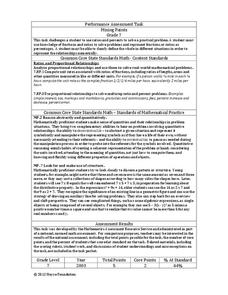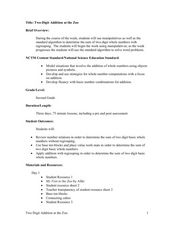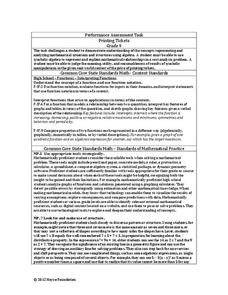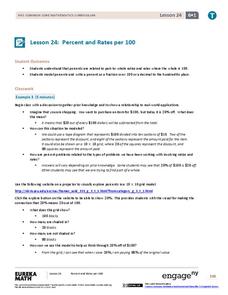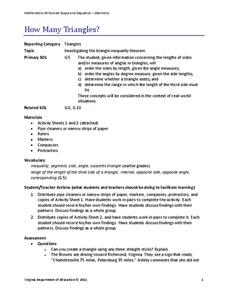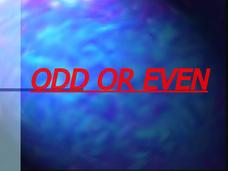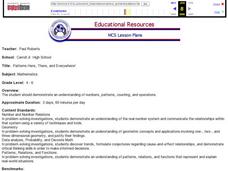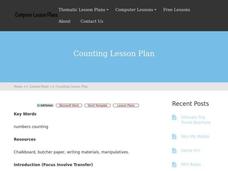Noyce Foundation
Mixing Paints
Let's paint the town equal parts yellow and violet, or simply brown. Pupils calculate the amount of blue and red paint needed to make six quarts of brown paint. Individuals then explain how they determined the percentage of the brown...
Inside Mathematics
Party
Thirty at the party won't cost any more than twenty-five. The assessment task provides a scenario for the cost of a party where the initial fee covers a given number of guests. The class determines the cost for specific numbers of guests...
Inside Mathematics
Marble Game
Pupils determine the theoretical probability of winning a game of marbles. Individuals compare the theoretical probability to experimental probability for the same game. They continue on to compare two different probability games.
Curated OER
Two-Digit Addition at the Zoo
Your second graders explore two digit addition with regrouping. They will investigate problem solving strategies within the context of a trip to the zoo. Multiple resources and assessments are provided.
Curated OER
Inequality and the 1/2 Benchmark
Fourth graders utilize fraction bar manipulatives to compare a variety of fractions to the fraction value 1/2. Pupils are put into groups, and they begin to see how fractions that look completely different actually represent the same...
Inside Mathematics
Printing Tickets
Determine the better deal. Pupils write the equation for the cost of printing tickets from different printers. They compare the costs graphically and algebraicaly to determine which printer has the best deal based upon the quantity of...
EngageNY
Examples of Functions from Geometry
Connect functions to geometry. In the ninth installment of a 12-part module, young mathematicians create functions by investigating situations in geometry. They look at both area and volume of figures to complete a well-rounded lesson plan.
EngageNY
Percent and Rates per 100
What percentage of your class understands percents? Pupils learn the meaning of percents based upon rates per 100 in the 24th lesson in a series of 29. They represent percents as fractions, decimals, ratios, and models. The scholars...
Curated OER
Encourage Hesitant Students to Love Math
Empower each and every student to persevere and strive for success in relation to mathematics.
Virginia Department of Education
Similar Triangles
Pupils work in pairs to investigate what it takes to prove that two triangles are similar. They work through various shortcuts to find which are enough to show a similarity relationship between the triangles. Small groups work with the...
Virginia Department of Education
How Many Triangles?
Something for young mathematicians to remember: the sum of any two sides must be greater than the third. Class members investigates the Triangle Inequality Theorem to find the relationship between the sides of a triangle. At the...
Curated OER
Apple Addition Cards
Kids love games and manipulatives, they make learning math fun. Print this set of 10 cards and the attached markers. Learners use the cards as a game, where they count the apples of the card then place a marker on the correct answer.
Curated OER
Divisor The Great! (Divide by Two-Digit Divisors)
Manipulatives make learning division easier! Your class will discover the difference between dividing with one- and two-digit divisors, and practice the procedures for each using the standard algorithm. They will use estimation to ensure...
Curated OER
Solving Problems Involving Subtraction
Here is an excellent lesson plan on solving subtraction word problems using fractions and mixed numbers. Learners complete three activities that will help them to explore and better-understand the world of mixed numbers. Fraction bars...
College Board
2000 AP® Calculus BC Free-Response Questions
How are concepts divided? Pupils use the AP® Calculus free-response questions to see how the exam addresses concepts. The concepts are divided into those that use calculators and others that do not. Calculator items require finding...
Curated OER
Odd or Even
A great way to show the difference between odd and even numbers is by using blocks. The graphics in this PowerPoint do a great job at showing the two groups of numbers. Tip: After viewing this presentation, have students experiment with...
K20 LEARN
Transformers Part 1 - Absolute Value and Quadratic Functions: Function Transformations
Transform your instruction with an exploratory lesson! Young scholars manipulate absolute values and quadratic functions to look for transformation patterns. They use the patterns to write general rules of transformations.
Mathalicious
Pandemic
Young scientists use exponential growth and logarithms to model how a virus spreads through a population. Pupils watch a news clip about the 2012 outbreak of Ebola. Scholars then manipulate inactive graphs to see how various factors...
Curated OER
Problem Solving Using Coin Identity and Coin Value
Students identify characteristics of a penny, nickel, dime, and quarter, match the value of coins, and practice using money for a purchase.
Curated OER
WS 1.0 Math Skills Update
In this math skills instructional activity, students find percentages, they convert from ordinary notation to scientific notation, they convert from scientific notation to ordinary notation and they manipulate algebraic expressions.
Curated OER
Dance, Dance, Dance
Use dance and song to help your charges in adding whole numbers to 10. In this adding to 10 lesson, learners become the manipulatives as you add them.
Curated OER
Patterns Here, There and Everywhere
Pattern recognition is a skill often used in mathematics. Learners count and sort manipulatives, organize the data into a graph and answer questions about the information displayed. They collect the objects to be used and create patterns...
Curated OER
Multiplication: A Treasure Hunt to Two and Three Digit by One Digit Multiplication
Here is a math lesson which has learners practice multiplying two and three digit numbers by one digit numbers. They discuss multiplication strategies and use those strategies to play a game.
Curated OER
Counting Lesson Plan
In whole group practice, children count together and identify how many objects are drawn on butcher paper, increasing the number when they have achieved fluency. In pairs, they count manipulatives. They then copy series of numbers from...
